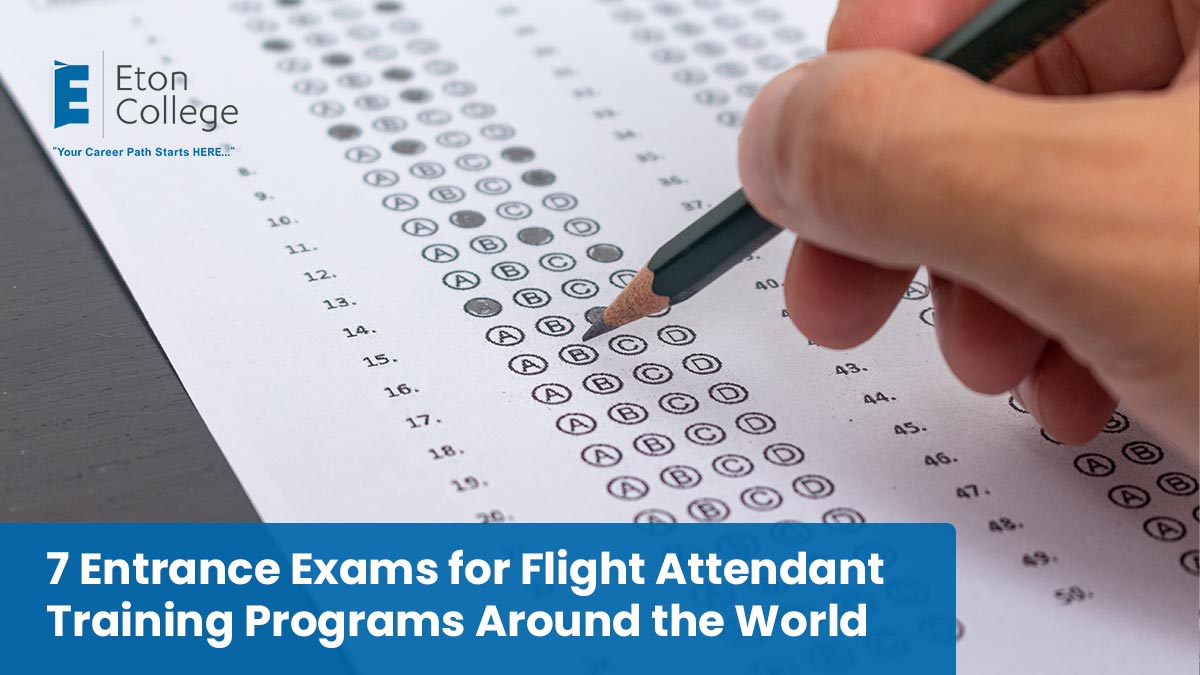- Entrance exams for flight attendants evaluate essential skills like communication, customer service, and problem-solving.
- Different countries have unique flight attendant entrance exams, designed to assess a range of competencies.
- Language proficiency is a major requirement for most entrance exams for flight attendants worldwide.
- Practical skills like safety procedures, emergency management, and teamwork are often part of the evaluation process in flight attendant exams.
- Preparing thoroughly for flight attendant entrance exams ensures candidates are ready for the competitive and demanding world of aviation.
Flight attendants undergo rigorous selection processes, including exams, to prepare for their roles in the aviation industry. These exams assess various skills, including language proficiency, customer service aptitude, safety knowledge, and problem-solving abilities.
In this blog, we’ll explore seven notable entrance exams for flight attendant training programs around the world and what candidates can expect during the selection process.
1. Japan Airlines Cabin Crew Exam (Japan)
In Japan, the recruitment process for flight attendants is highly competitive and structured. The entrance exams for flight attendants in Japan often begin with a written test that evaluates candidates’ general knowledge, language skills, and reasoning abilities. The exam typically includes:
- English proficiency tests: Since English is the international language of aviation, candidates are required to demonstrate strong language skills.
- Personality tests: These exams help assess if candidates have the right temperament for working in high-pressure environments while maintaining professionalism.
After passing the written exam, candidates are invited for group discussions and interviews, where communication and teamwork skills are evaluated.
2. Korean Air Cabin Crew Recruitment Exam (South Korea)
Korean Air is known for its competitive selection process, which includes an entrance exam for flight attendants. Candidates are required to pass several stages of testing, starting with a written exam that tests their English proficiency, problem-solving abilities, and logical reasoning. The airline also includes personality tests to assess whether applicants have the right demeanor for customer service and teamwork in a fast-paced environment.
The recruitment process also involves physical assessments, such as height and reach tests, which are crucial for ensuring flight attendants can perform their duties, especially when dealing with overhead compartments and emergency equipment.
3. IndiGo Airlines Selection Process (India)
IndiGo Airlines in India doesn’t have a standardized entrance exam for flight attendants, but its rigorous selection process serves a similar purpose. The recruitment begins with a walk-in interview or online application, followed by several rounds of assessments. These assessments include:
- Group discussions: Candidates are tested on their communication skills and their ability to handle situations that may arise during a flight.
- Aptitude tests: These tests evaluate logical reasoning, language skills, and customer service aptitude.
IndiGo also conducts medical evaluations and personal interviews to assess the candidate’s fitness for the job. Although there is no formal entrance exam for flight attendants, the multiple stages of testing ensure only the best candidates are selected for their training program.
4. Lufthansa Flight Attendant Assessment (Germany)
Lufthansa, one of Europe’s leading airlines, has a comprehensive selection process for its flight attendants. The recruitment process includes an entrance exam for flight attendants that evaluates candidates’ English proficiency, problem-solving skills, and cognitive abilities.
A unique aspect of Lufthansa’s process is the situational judgment tests, where candidates are asked how they would respond to specific scenarios, such as dealing with an unruly passenger or managing an in-flight emergency. After passing the written test, candidates undergo personal interviews and group exercises designed to assess their teamwork, leadership, and communication skills.
5. Emirates Cabin Crew Recruitment Process (United Arab Emirates)
Emirates is known for its world-class cabin crew, and its selection process is highly competitive. While there is no formal entrance exam for flight attendants, candidates must go through a multi-step process that includes:
- English language assessments: Since English is the international language of aviation, candidates are tested on their fluency and comprehension.
- Personality tests: Emirates seeks candidates with the right balance of warmth, professionalism, and problem-solving skills.
- Group discussions: Candidates are given hypothetical situations related to in-flight service and safety, and their responses are evaluated for leadership and teamwork qualities.
After successfully passing these assessments, candidates must complete personal interviews and undergo physical assessments.
6. Singapore Airlines Cabin Crew Selection (Singapore)
Singapore Airlines has a structured recruitment process for flight attendants that includes a series of assessments resembling an entrance exam for flight attendants. This selection process includes:
- Aptitude and reasoning tests: These tests assess a candidate’s ability to handle complex situations and think critically.
- Language proficiency tests: As a global airline, Singapore Airlines requires strong English communication skills, along with other language proficiencies if applicable.
- Situational judgment tests: These tests help recruiters understand how candidates would handle real-life scenarios, such as customer complaints or emergency situations.
Singapore Airlines also emphasizes the importance of physical appearance and grooming, which is tested during the face-to-face interviews that follow the written assessments.
7. Air New Zealand Flight Attendant Selection (New Zealand)
Air New Zealand has a rigorous recruitment process for its flight attendants, starting with an entrance exam for flight attendants that evaluates candidates’ language proficiency, problem-solving skills, and ability to work under pressure. The airline also conducts group interviews, where candidates are assessed on their teamwork, communication skills, and ability to handle stressful situations.
In addition to the written and group assessments, Air New Zealand candidates undergo medical evaluations and personal interviews to ensure they meet the airline’s high standards for safety, professionalism, and customer service.
From Exams to Sky-High Success
No matter where in the world you’re applying, preparing for the entrance exams for flight attendants requires dedication, focus, and a passion for the job. Airlines want to ensure that their flight attendants possess the right combination of skills, knowledge, and temperament to succeed in this demanding role.
To excel in these entrance exams for flight attendants and interviews, aspiring candidates should focus on improving their language skills, customer service abilities, and situational awareness. Additionally, understanding the specific requirements of the airline you’re applying to is crucial.
For those in Canada or looking to pursue a career in the aviation industry, Eton College offers a comprehensive Flight Attendant Preparation Program. This program is designed to equip students with the essential skills and knowledge needed to excel in the airline recruitment process and beyond. From customer service training to safety procedures, Eton College provides the foundation for success in this exciting and rewarding career path.




